Report on CSR and ICSR: Emaar, Damac, and Dubai Properties in the UAE
VerifiedAdded on 2023/06/11
|25
|6749
|393
Report
AI Summary
This report examines the corporate social responsibility (CSR) and Islamic corporate social responsibility (ICSR) practices of three major property developers in Dubai, United Arab Emirates: Emaar Properties, Dubai Properties, and Damac Properties. It highlights the importance of these companies giving back to the community, focusing on initiatives that promote welfare and wellbeing. The report analyzes how these companies engage with stakeholders, utilize communication channels, and integrate stakeholder demands into their strategies. It also explores the differences between western CSR and Islamic CSR, emphasizing the religious requirement in Sharia law for institutions to contribute to the larger environment. Furthermore, the report discusses the concept of corporate social susceptibility and its relationship to stakeholder management, ultimately aiming to provide insights into how companies can effectively contribute to sustainable development within their socio-economic environment.

1
CSR and ICSR
Name:
Course
Professor’s name
University name
City, State
Date of submission
CSR and ICSR
Name:
Course
Professor’s name
University name
City, State
Date of submission
Paraphrase This Document
Need a fresh take? Get an instant paraphrase of this document with our AI Paraphraser
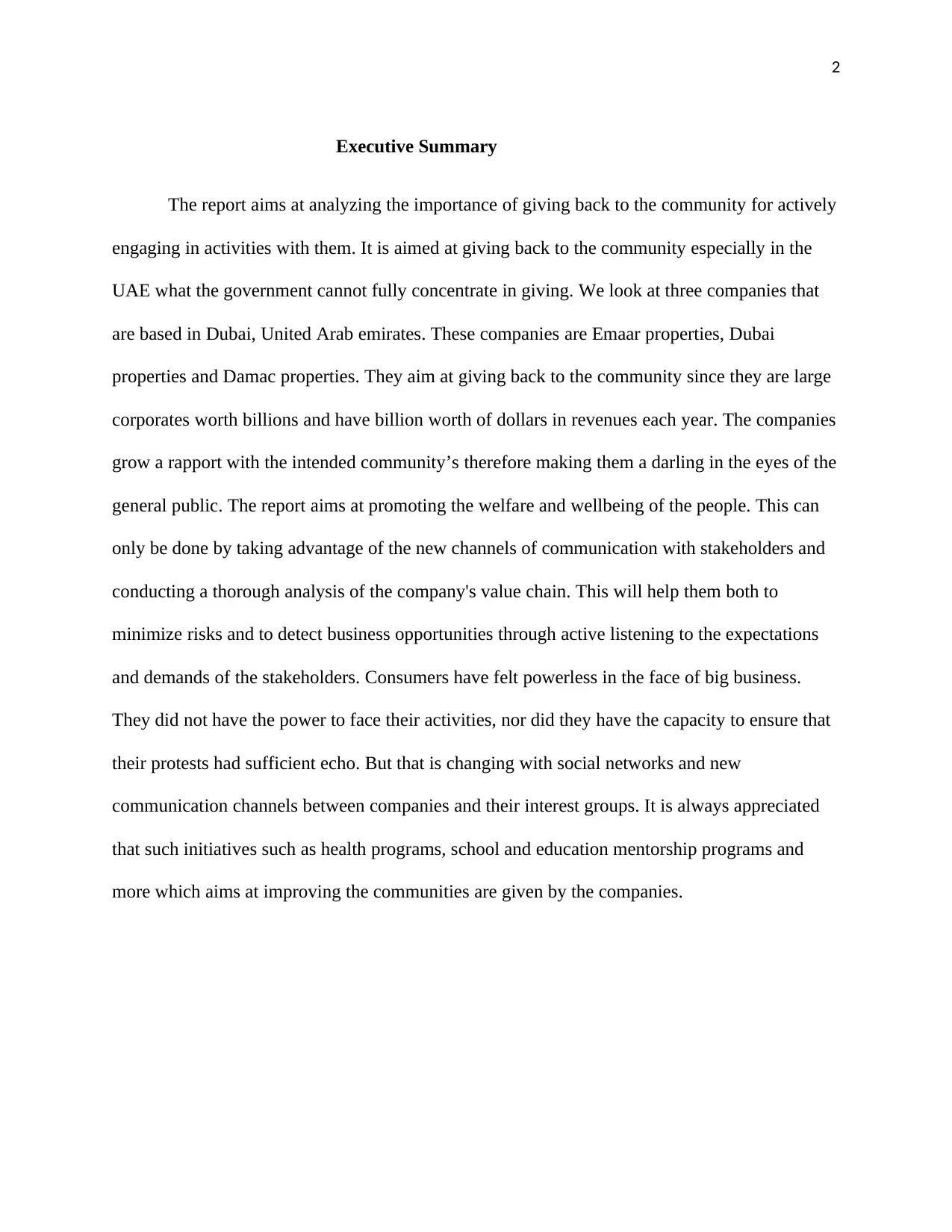
2
Executive Summary
The report aims at analyzing the importance of giving back to the community for actively
engaging in activities with them. It is aimed at giving back to the community especially in the
UAE what the government cannot fully concentrate in giving. We look at three companies that
are based in Dubai, United Arab emirates. These companies are Emaar properties, Dubai
properties and Damac properties. They aim at giving back to the community since they are large
corporates worth billions and have billion worth of dollars in revenues each year. The companies
grow a rapport with the intended community’s therefore making them a darling in the eyes of the
general public. The report aims at promoting the welfare and wellbeing of the people. This can
only be done by taking advantage of the new channels of communication with stakeholders and
conducting a thorough analysis of the company's value chain. This will help them both to
minimize risks and to detect business opportunities through active listening to the expectations
and demands of the stakeholders. Consumers have felt powerless in the face of big business.
They did not have the power to face their activities, nor did they have the capacity to ensure that
their protests had sufficient echo. But that is changing with social networks and new
communication channels between companies and their interest groups. It is always appreciated
that such initiatives such as health programs, school and education mentorship programs and
more which aims at improving the communities are given by the companies.
Executive Summary
The report aims at analyzing the importance of giving back to the community for actively
engaging in activities with them. It is aimed at giving back to the community especially in the
UAE what the government cannot fully concentrate in giving. We look at three companies that
are based in Dubai, United Arab emirates. These companies are Emaar properties, Dubai
properties and Damac properties. They aim at giving back to the community since they are large
corporates worth billions and have billion worth of dollars in revenues each year. The companies
grow a rapport with the intended community’s therefore making them a darling in the eyes of the
general public. The report aims at promoting the welfare and wellbeing of the people. This can
only be done by taking advantage of the new channels of communication with stakeholders and
conducting a thorough analysis of the company's value chain. This will help them both to
minimize risks and to detect business opportunities through active listening to the expectations
and demands of the stakeholders. Consumers have felt powerless in the face of big business.
They did not have the power to face their activities, nor did they have the capacity to ensure that
their protests had sufficient echo. But that is changing with social networks and new
communication channels between companies and their interest groups. It is always appreciated
that such initiatives such as health programs, school and education mentorship programs and
more which aims at improving the communities are given by the companies.
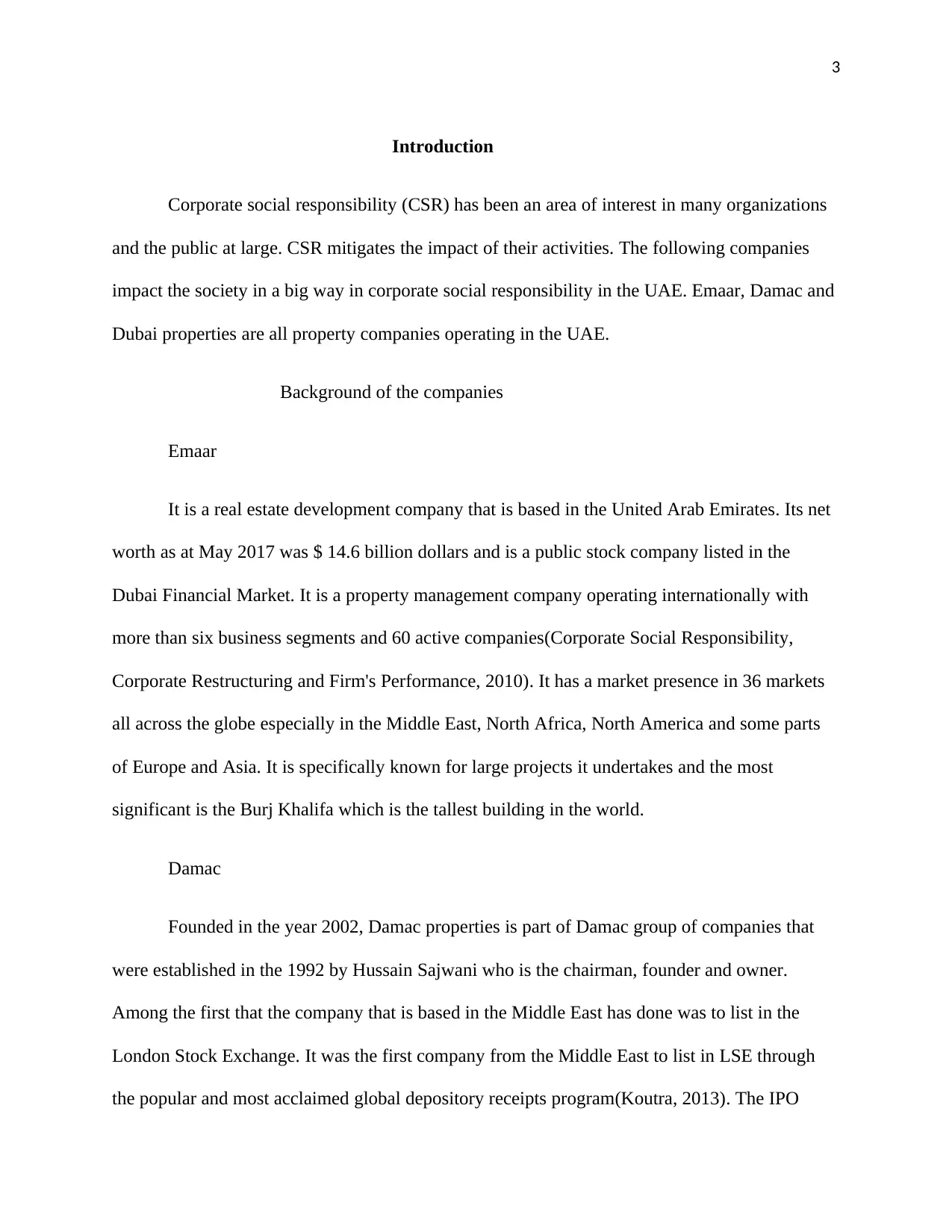
3
Introduction
Corporate social responsibility (CSR) has been an area of interest in many organizations
and the public at large. CSR mitigates the impact of their activities. The following companies
impact the society in a big way in corporate social responsibility in the UAE. Emaar, Damac and
Dubai properties are all property companies operating in the UAE.
Background of the companies
Emaar
It is a real estate development company that is based in the United Arab Emirates. Its net
worth as at May 2017 was $ 14.6 billion dollars and is a public stock company listed in the
Dubai Financial Market. It is a property management company operating internationally with
more than six business segments and 60 active companies(Corporate Social Responsibility,
Corporate Restructuring and Firm's Performance, 2010). It has a market presence in 36 markets
all across the globe especially in the Middle East, North Africa, North America and some parts
of Europe and Asia. It is specifically known for large projects it undertakes and the most
significant is the Burj Khalifa which is the tallest building in the world.
Damac
Founded in the year 2002, Damac properties is part of Damac group of companies that
were established in the 1992 by Hussain Sajwani who is the chairman, founder and owner.
Among the first that the company that is based in the Middle East has done was to list in the
London Stock Exchange. It was the first company from the Middle East to list in LSE through
the popular and most acclaimed global depository receipts program(Koutra, 2013). The IPO
Introduction
Corporate social responsibility (CSR) has been an area of interest in many organizations
and the public at large. CSR mitigates the impact of their activities. The following companies
impact the society in a big way in corporate social responsibility in the UAE. Emaar, Damac and
Dubai properties are all property companies operating in the UAE.
Background of the companies
Emaar
It is a real estate development company that is based in the United Arab Emirates. Its net
worth as at May 2017 was $ 14.6 billion dollars and is a public stock company listed in the
Dubai Financial Market. It is a property management company operating internationally with
more than six business segments and 60 active companies(Corporate Social Responsibility,
Corporate Restructuring and Firm's Performance, 2010). It has a market presence in 36 markets
all across the globe especially in the Middle East, North Africa, North America and some parts
of Europe and Asia. It is specifically known for large projects it undertakes and the most
significant is the Burj Khalifa which is the tallest building in the world.
Damac
Founded in the year 2002, Damac properties is part of Damac group of companies that
were established in the 1992 by Hussain Sajwani who is the chairman, founder and owner.
Among the first that the company that is based in the Middle East has done was to list in the
London Stock Exchange. It was the first company from the Middle East to list in LSE through
the popular and most acclaimed global depository receipts program(Koutra, 2013). The IPO
⊘ This is a preview!⊘
Do you want full access?
Subscribe today to unlock all pages.

Trusted by 1+ million students worldwide
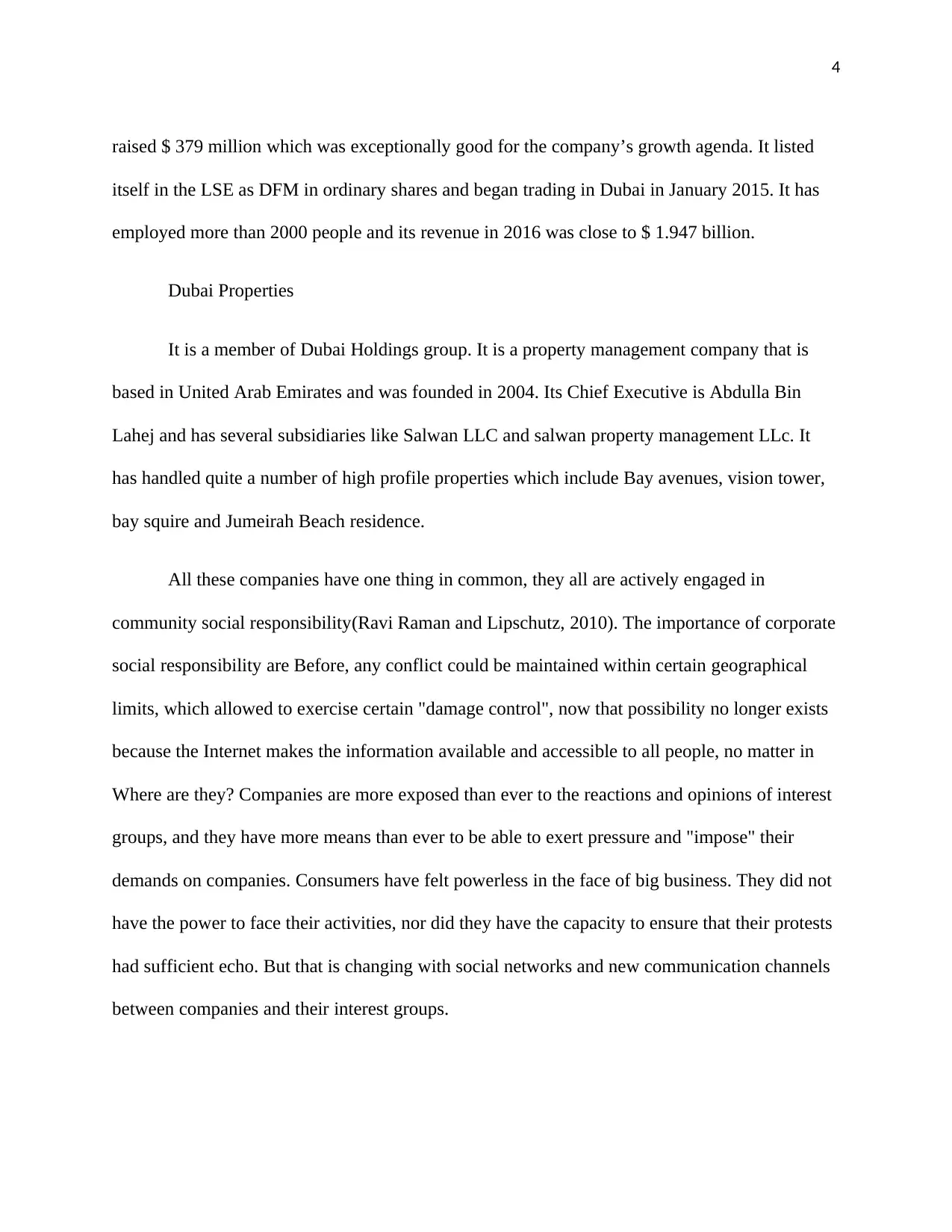
4
raised $ 379 million which was exceptionally good for the company’s growth agenda. It listed
itself in the LSE as DFM in ordinary shares and began trading in Dubai in January 2015. It has
employed more than 2000 people and its revenue in 2016 was close to $ 1.947 billion.
Dubai Properties
It is a member of Dubai Holdings group. It is a property management company that is
based in United Arab Emirates and was founded in 2004. Its Chief Executive is Abdulla Bin
Lahej and has several subsidiaries like Salwan LLC and salwan property management LLc. It
has handled quite a number of high profile properties which include Bay avenues, vision tower,
bay squire and Jumeirah Beach residence.
All these companies have one thing in common, they all are actively engaged in
community social responsibility(Ravi Raman and Lipschutz, 2010). The importance of corporate
social responsibility are Before, any conflict could be maintained within certain geographical
limits, which allowed to exercise certain "damage control", now that possibility no longer exists
because the Internet makes the information available and accessible to all people, no matter in
Where are they? Companies are more exposed than ever to the reactions and opinions of interest
groups, and they have more means than ever to be able to exert pressure and "impose" their
demands on companies. Consumers have felt powerless in the face of big business. They did not
have the power to face their activities, nor did they have the capacity to ensure that their protests
had sufficient echo. But that is changing with social networks and new communication channels
between companies and their interest groups.
raised $ 379 million which was exceptionally good for the company’s growth agenda. It listed
itself in the LSE as DFM in ordinary shares and began trading in Dubai in January 2015. It has
employed more than 2000 people and its revenue in 2016 was close to $ 1.947 billion.
Dubai Properties
It is a member of Dubai Holdings group. It is a property management company that is
based in United Arab Emirates and was founded in 2004. Its Chief Executive is Abdulla Bin
Lahej and has several subsidiaries like Salwan LLC and salwan property management LLc. It
has handled quite a number of high profile properties which include Bay avenues, vision tower,
bay squire and Jumeirah Beach residence.
All these companies have one thing in common, they all are actively engaged in
community social responsibility(Ravi Raman and Lipschutz, 2010). The importance of corporate
social responsibility are Before, any conflict could be maintained within certain geographical
limits, which allowed to exercise certain "damage control", now that possibility no longer exists
because the Internet makes the information available and accessible to all people, no matter in
Where are they? Companies are more exposed than ever to the reactions and opinions of interest
groups, and they have more means than ever to be able to exert pressure and "impose" their
demands on companies. Consumers have felt powerless in the face of big business. They did not
have the power to face their activities, nor did they have the capacity to ensure that their protests
had sufficient echo. But that is changing with social networks and new communication channels
between companies and their interest groups.
Paraphrase This Document
Need a fresh take? Get an instant paraphrase of this document with our AI Paraphraser
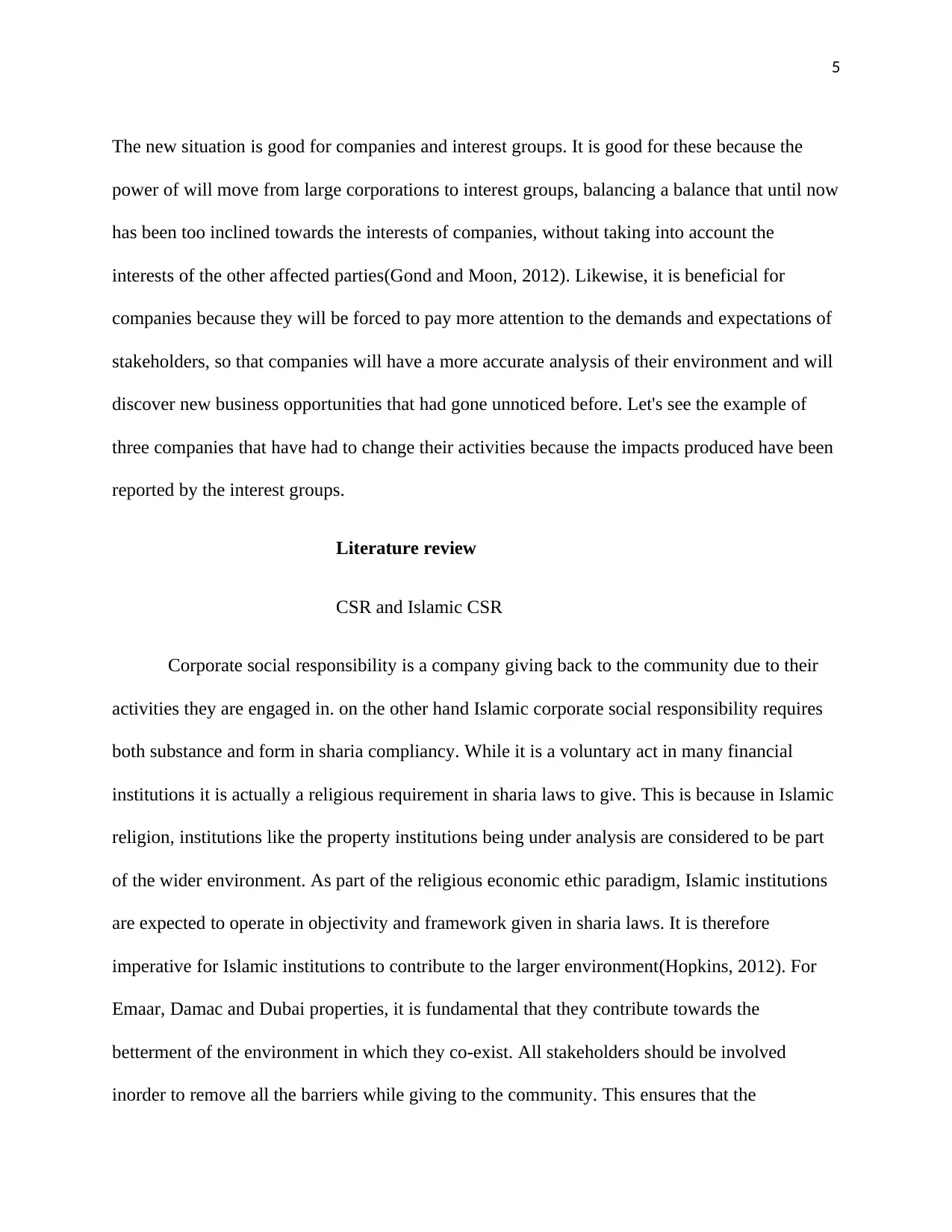
5
The new situation is good for companies and interest groups. It is good for these because the
power of will move from large corporations to interest groups, balancing a balance that until now
has been too inclined towards the interests of companies, without taking into account the
interests of the other affected parties(Gond and Moon, 2012). Likewise, it is beneficial for
companies because they will be forced to pay more attention to the demands and expectations of
stakeholders, so that companies will have a more accurate analysis of their environment and will
discover new business opportunities that had gone unnoticed before. Let's see the example of
three companies that have had to change their activities because the impacts produced have been
reported by the interest groups.
Literature review
CSR and Islamic CSR
Corporate social responsibility is a company giving back to the community due to their
activities they are engaged in. on the other hand Islamic corporate social responsibility requires
both substance and form in sharia compliancy. While it is a voluntary act in many financial
institutions it is actually a religious requirement in sharia laws to give. This is because in Islamic
religion, institutions like the property institutions being under analysis are considered to be part
of the wider environment. As part of the religious economic ethic paradigm, Islamic institutions
are expected to operate in objectivity and framework given in sharia laws. It is therefore
imperative for Islamic institutions to contribute to the larger environment(Hopkins, 2012). For
Emaar, Damac and Dubai properties, it is fundamental that they contribute towards the
betterment of the environment in which they co-exist. All stakeholders should be involved
inorder to remove all the barriers while giving to the community. This ensures that the
The new situation is good for companies and interest groups. It is good for these because the
power of will move from large corporations to interest groups, balancing a balance that until now
has been too inclined towards the interests of companies, without taking into account the
interests of the other affected parties(Gond and Moon, 2012). Likewise, it is beneficial for
companies because they will be forced to pay more attention to the demands and expectations of
stakeholders, so that companies will have a more accurate analysis of their environment and will
discover new business opportunities that had gone unnoticed before. Let's see the example of
three companies that have had to change their activities because the impacts produced have been
reported by the interest groups.
Literature review
CSR and Islamic CSR
Corporate social responsibility is a company giving back to the community due to their
activities they are engaged in. on the other hand Islamic corporate social responsibility requires
both substance and form in sharia compliancy. While it is a voluntary act in many financial
institutions it is actually a religious requirement in sharia laws to give. This is because in Islamic
religion, institutions like the property institutions being under analysis are considered to be part
of the wider environment. As part of the religious economic ethic paradigm, Islamic institutions
are expected to operate in objectivity and framework given in sharia laws. It is therefore
imperative for Islamic institutions to contribute to the larger environment(Hopkins, 2012). For
Emaar, Damac and Dubai properties, it is fundamental that they contribute towards the
betterment of the environment in which they co-exist. All stakeholders should be involved
inorder to remove all the barriers while giving to the community. This ensures that the
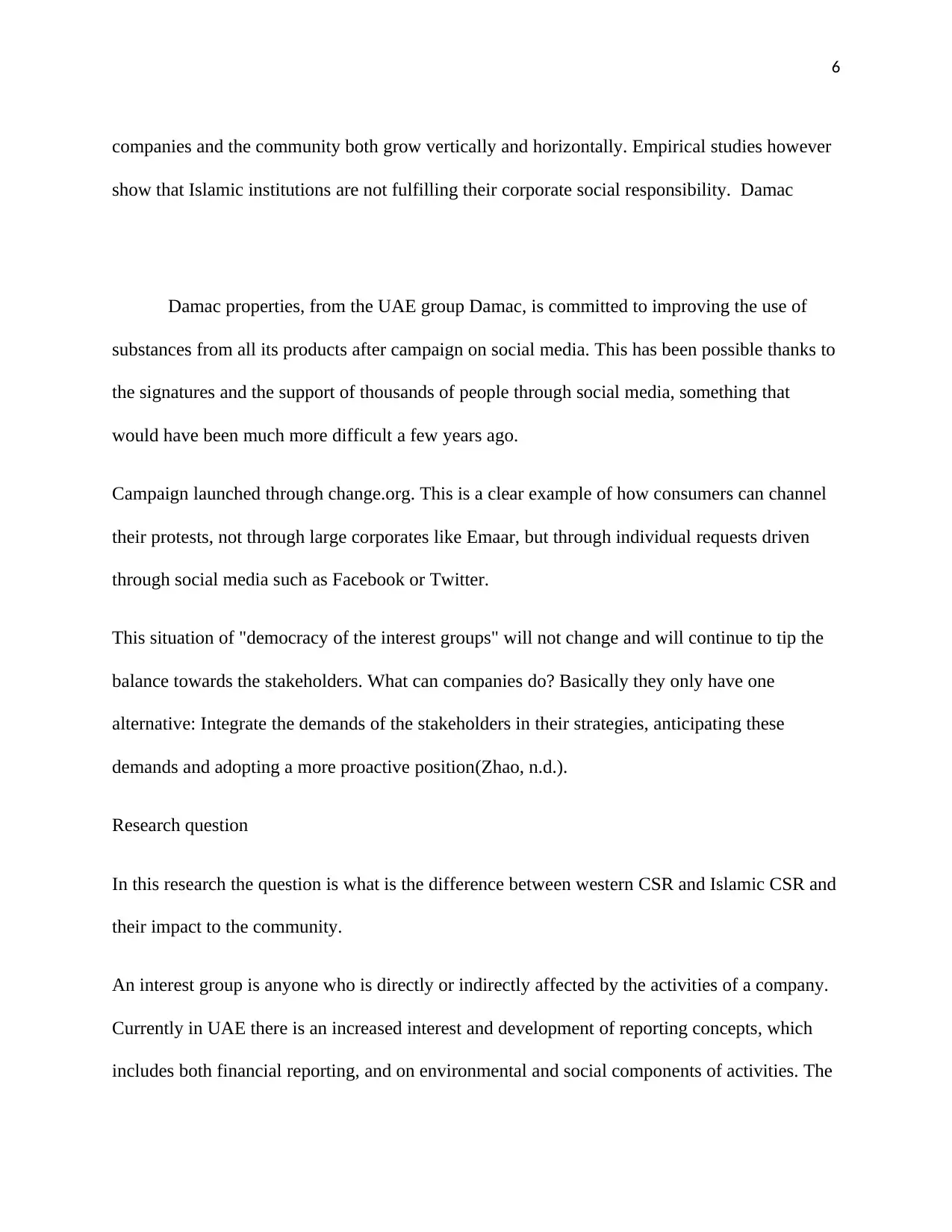
6
companies and the community both grow vertically and horizontally. Empirical studies however
show that Islamic institutions are not fulfilling their corporate social responsibility. Damac
Damac properties, from the UAE group Damac, is committed to improving the use of
substances from all its products after campaign on social media. This has been possible thanks to
the signatures and the support of thousands of people through social media, something that
would have been much more difficult a few years ago.
Campaign launched through change.org. This is a clear example of how consumers can channel
their protests, not through large corporates like Emaar, but through individual requests driven
through social media such as Facebook or Twitter.
This situation of "democracy of the interest groups" will not change and will continue to tip the
balance towards the stakeholders. What can companies do? Basically they only have one
alternative: Integrate the demands of the stakeholders in their strategies, anticipating these
demands and adopting a more proactive position(Zhao, n.d.).
Research question
In this research the question is what is the difference between western CSR and Islamic CSR and
their impact to the community.
An interest group is anyone who is directly or indirectly affected by the activities of a company.
Currently in UAE there is an increased interest and development of reporting concepts, which
includes both financial reporting, and on environmental and social components of activities. The
companies and the community both grow vertically and horizontally. Empirical studies however
show that Islamic institutions are not fulfilling their corporate social responsibility. Damac
Damac properties, from the UAE group Damac, is committed to improving the use of
substances from all its products after campaign on social media. This has been possible thanks to
the signatures and the support of thousands of people through social media, something that
would have been much more difficult a few years ago.
Campaign launched through change.org. This is a clear example of how consumers can channel
their protests, not through large corporates like Emaar, but through individual requests driven
through social media such as Facebook or Twitter.
This situation of "democracy of the interest groups" will not change and will continue to tip the
balance towards the stakeholders. What can companies do? Basically they only have one
alternative: Integrate the demands of the stakeholders in their strategies, anticipating these
demands and adopting a more proactive position(Zhao, n.d.).
Research question
In this research the question is what is the difference between western CSR and Islamic CSR and
their impact to the community.
An interest group is anyone who is directly or indirectly affected by the activities of a company.
Currently in UAE there is an increased interest and development of reporting concepts, which
includes both financial reporting, and on environmental and social components of activities. The
⊘ This is a preview!⊘
Do you want full access?
Subscribe today to unlock all pages.

Trusted by 1+ million students worldwide
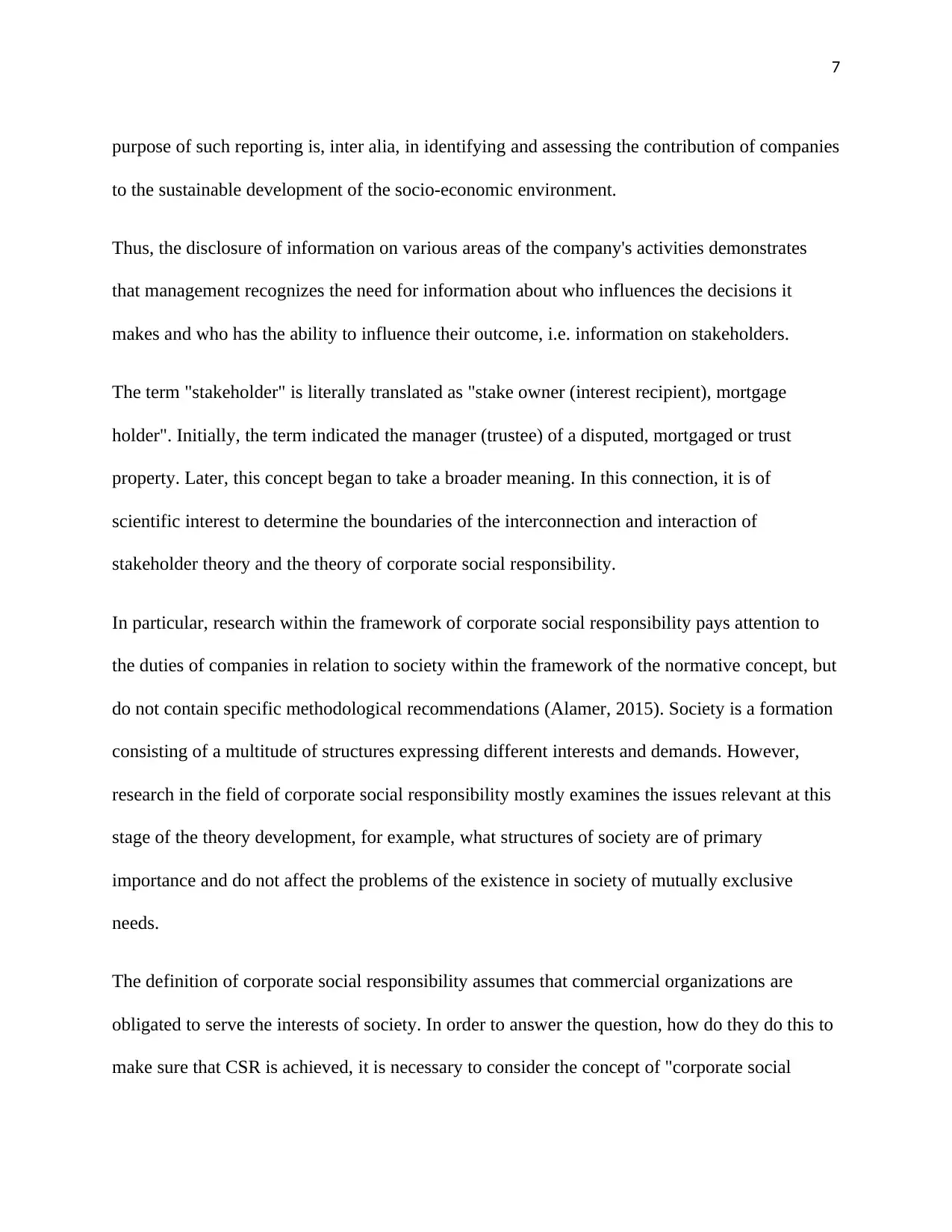
7
purpose of such reporting is, inter alia, in identifying and assessing the contribution of companies
to the sustainable development of the socio-economic environment.
Thus, the disclosure of information on various areas of the company's activities demonstrates
that management recognizes the need for information about who influences the decisions it
makes and who has the ability to influence their outcome, i.e. information on stakeholders.
The term "stakeholder" is literally translated as "stake owner (interest recipient), mortgage
holder". Initially, the term indicated the manager (trustee) of a disputed, mortgaged or trust
property. Later, this concept began to take a broader meaning. In this connection, it is of
scientific interest to determine the boundaries of the interconnection and interaction of
stakeholder theory and the theory of corporate social responsibility.
In particular, research within the framework of corporate social responsibility pays attention to
the duties of companies in relation to society within the framework of the normative concept, but
do not contain specific methodological recommendations (Alamer, 2015). Society is a formation
consisting of a multitude of structures expressing different interests and demands. However,
research in the field of corporate social responsibility mostly examines the issues relevant at this
stage of the theory development, for example, what structures of society are of primary
importance and do not affect the problems of the existence in society of mutually exclusive
needs.
The definition of corporate social responsibility assumes that commercial organizations are
obligated to serve the interests of society. In order to answer the question, how do they do this to
make sure that CSR is achieved, it is necessary to consider the concept of "corporate social
purpose of such reporting is, inter alia, in identifying and assessing the contribution of companies
to the sustainable development of the socio-economic environment.
Thus, the disclosure of information on various areas of the company's activities demonstrates
that management recognizes the need for information about who influences the decisions it
makes and who has the ability to influence their outcome, i.e. information on stakeholders.
The term "stakeholder" is literally translated as "stake owner (interest recipient), mortgage
holder". Initially, the term indicated the manager (trustee) of a disputed, mortgaged or trust
property. Later, this concept began to take a broader meaning. In this connection, it is of
scientific interest to determine the boundaries of the interconnection and interaction of
stakeholder theory and the theory of corporate social responsibility.
In particular, research within the framework of corporate social responsibility pays attention to
the duties of companies in relation to society within the framework of the normative concept, but
do not contain specific methodological recommendations (Alamer, 2015). Society is a formation
consisting of a multitude of structures expressing different interests and demands. However,
research in the field of corporate social responsibility mostly examines the issues relevant at this
stage of the theory development, for example, what structures of society are of primary
importance and do not affect the problems of the existence in society of mutually exclusive
needs.
The definition of corporate social responsibility assumes that commercial organizations are
obligated to serve the interests of society. In order to answer the question, how do they do this to
make sure that CSR is achieved, it is necessary to consider the concept of "corporate social
Paraphrase This Document
Need a fresh take? Get an instant paraphrase of this document with our AI Paraphraser
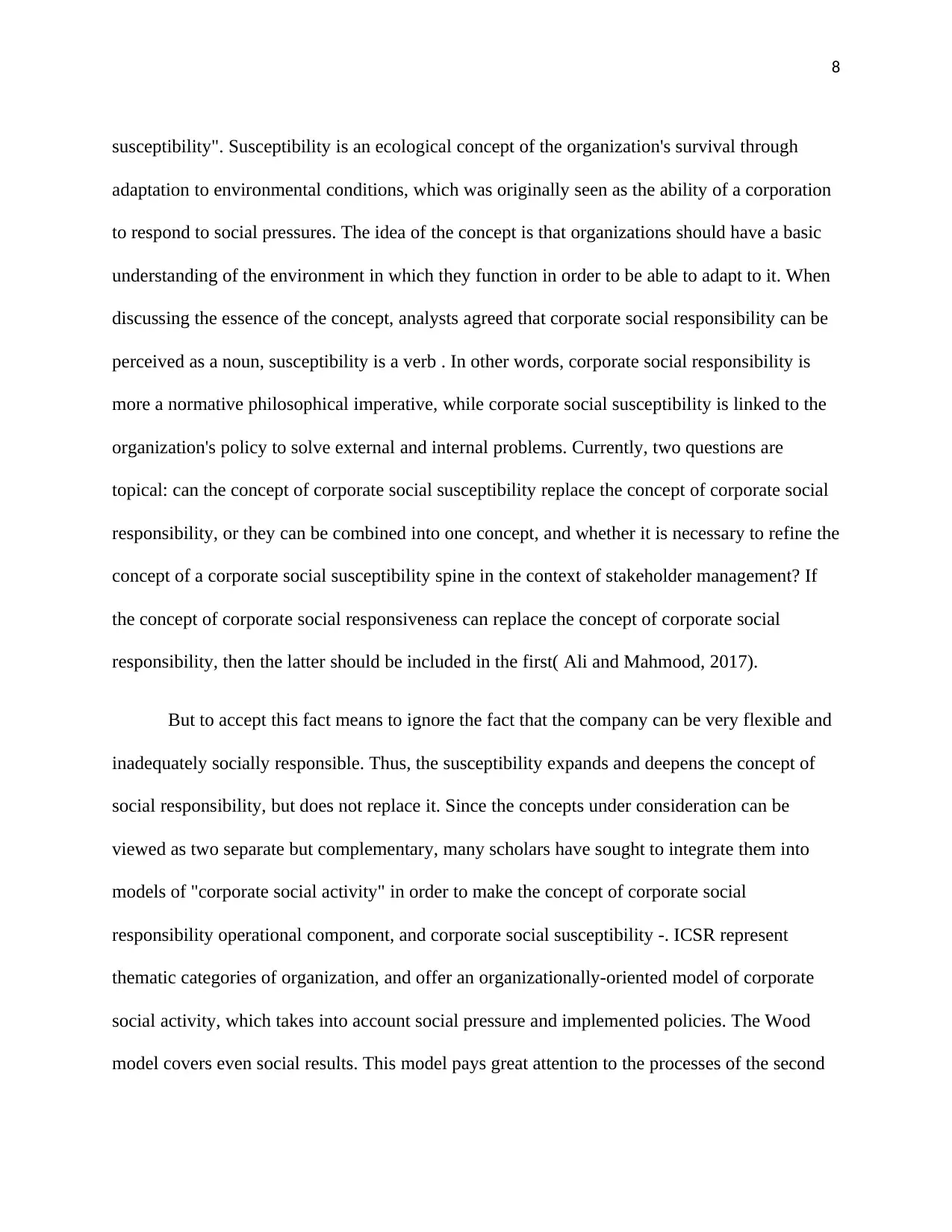
8
susceptibility". Susceptibility is an ecological concept of the organization's survival through
adaptation to environmental conditions, which was originally seen as the ability of a corporation
to respond to social pressures. The idea of the concept is that organizations should have a basic
understanding of the environment in which they function in order to be able to adapt to it. When
discussing the essence of the concept, analysts agreed that corporate social responsibility can be
perceived as a noun, susceptibility is a verb . In other words, corporate social responsibility is
more a normative philosophical imperative, while corporate social susceptibility is linked to the
organization's policy to solve external and internal problems. Currently, two questions are
topical: can the concept of corporate social susceptibility replace the concept of corporate social
responsibility, or they can be combined into one concept, and whether it is necessary to refine the
concept of a corporate social susceptibility spine in the context of stakeholder management? If
the concept of corporate social responsiveness can replace the concept of corporate social
responsibility, then the latter should be included in the first( Ali and Mahmood, 2017).
But to accept this fact means to ignore the fact that the company can be very flexible and
inadequately socially responsible. Thus, the susceptibility expands and deepens the concept of
social responsibility, but does not replace it. Since the concepts under consideration can be
viewed as two separate but complementary, many scholars have sought to integrate them into
models of "corporate social activity" in order to make the concept of corporate social
responsibility operational component, and corporate social susceptibility -. ICSR represent
thematic categories of organization, and offer an organizationally-oriented model of corporate
social activity, which takes into account social pressure and implemented policies. The Wood
model covers even social results. This model pays great attention to the processes of the second
susceptibility". Susceptibility is an ecological concept of the organization's survival through
adaptation to environmental conditions, which was originally seen as the ability of a corporation
to respond to social pressures. The idea of the concept is that organizations should have a basic
understanding of the environment in which they function in order to be able to adapt to it. When
discussing the essence of the concept, analysts agreed that corporate social responsibility can be
perceived as a noun, susceptibility is a verb . In other words, corporate social responsibility is
more a normative philosophical imperative, while corporate social susceptibility is linked to the
organization's policy to solve external and internal problems. Currently, two questions are
topical: can the concept of corporate social susceptibility replace the concept of corporate social
responsibility, or they can be combined into one concept, and whether it is necessary to refine the
concept of a corporate social susceptibility spine in the context of stakeholder management? If
the concept of corporate social responsiveness can replace the concept of corporate social
responsibility, then the latter should be included in the first( Ali and Mahmood, 2017).
But to accept this fact means to ignore the fact that the company can be very flexible and
inadequately socially responsible. Thus, the susceptibility expands and deepens the concept of
social responsibility, but does not replace it. Since the concepts under consideration can be
viewed as two separate but complementary, many scholars have sought to integrate them into
models of "corporate social activity" in order to make the concept of corporate social
responsibility operational component, and corporate social susceptibility -. ICSR represent
thematic categories of organization, and offer an organizationally-oriented model of corporate
social activity, which takes into account social pressure and implemented policies. The Wood
model covers even social results. This model pays great attention to the processes of the second
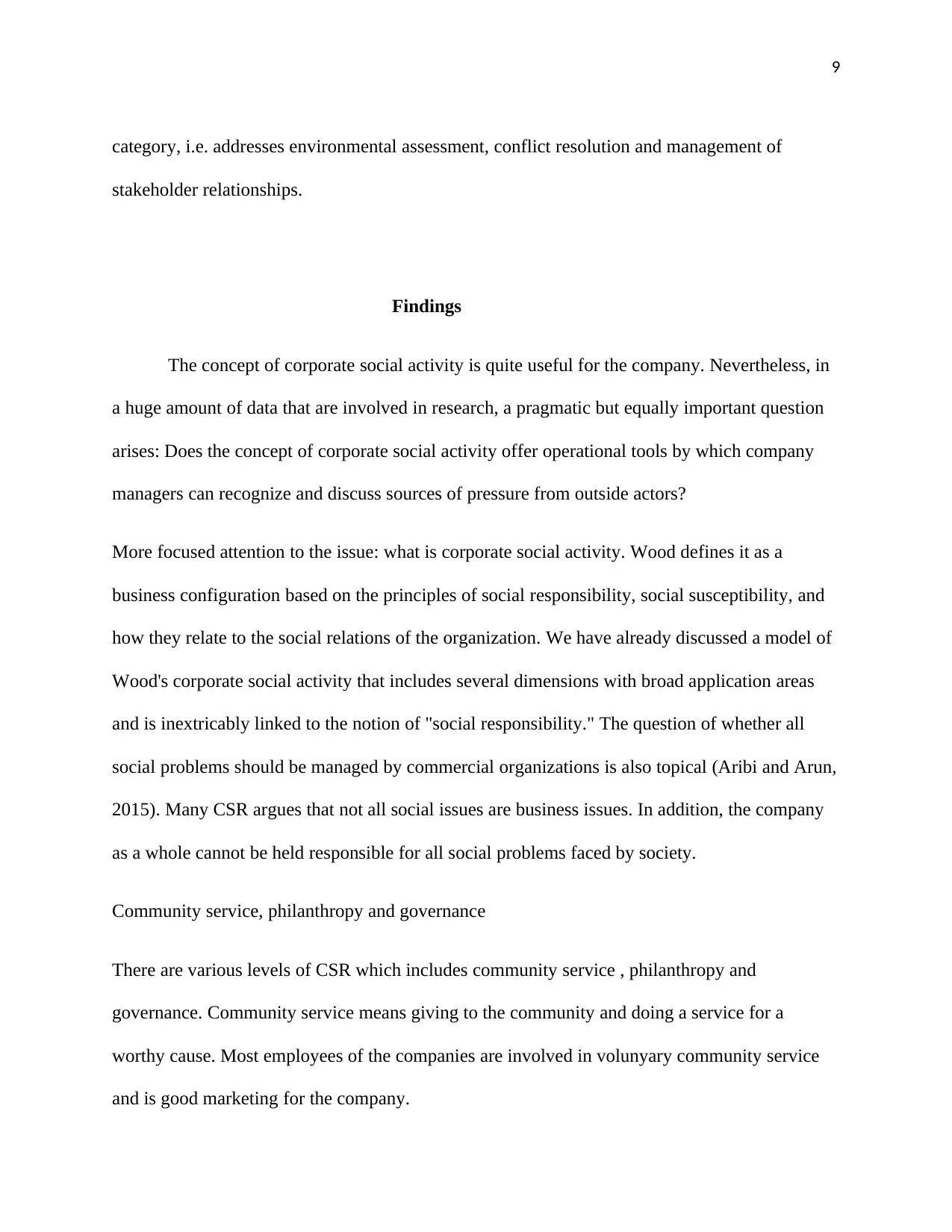
9
category, i.e. addresses environmental assessment, conflict resolution and management of
stakeholder relationships.
Findings
The concept of corporate social activity is quite useful for the company. Nevertheless, in
a huge amount of data that are involved in research, a pragmatic but equally important question
arises: Does the concept of corporate social activity offer operational tools by which company
managers can recognize and discuss sources of pressure from outside actors?
More focused attention to the issue: what is corporate social activity. Wood defines it as a
business configuration based on the principles of social responsibility, social susceptibility, and
how they relate to the social relations of the organization. We have already discussed a model of
Wood's corporate social activity that includes several dimensions with broad application areas
and is inextricably linked to the notion of "social responsibility." The question of whether all
social problems should be managed by commercial organizations is also topical (Aribi and Arun,
2015). Many CSR argues that not all social issues are business issues. In addition, the company
as a whole cannot be held responsible for all social problems faced by society.
Community service, philanthropy and governance
There are various levels of CSR which includes community service , philanthropy and
governance. Community service means giving to the community and doing a service for a
worthy cause. Most employees of the companies are involved in volunyary community service
and is good marketing for the company.
category, i.e. addresses environmental assessment, conflict resolution and management of
stakeholder relationships.
Findings
The concept of corporate social activity is quite useful for the company. Nevertheless, in
a huge amount of data that are involved in research, a pragmatic but equally important question
arises: Does the concept of corporate social activity offer operational tools by which company
managers can recognize and discuss sources of pressure from outside actors?
More focused attention to the issue: what is corporate social activity. Wood defines it as a
business configuration based on the principles of social responsibility, social susceptibility, and
how they relate to the social relations of the organization. We have already discussed a model of
Wood's corporate social activity that includes several dimensions with broad application areas
and is inextricably linked to the notion of "social responsibility." The question of whether all
social problems should be managed by commercial organizations is also topical (Aribi and Arun,
2015). Many CSR argues that not all social issues are business issues. In addition, the company
as a whole cannot be held responsible for all social problems faced by society.
Community service, philanthropy and governance
There are various levels of CSR which includes community service , philanthropy and
governance. Community service means giving to the community and doing a service for a
worthy cause. Most employees of the companies are involved in volunyary community service
and is good marketing for the company.
⊘ This is a preview!⊘
Do you want full access?
Subscribe today to unlock all pages.

Trusted by 1+ million students worldwide
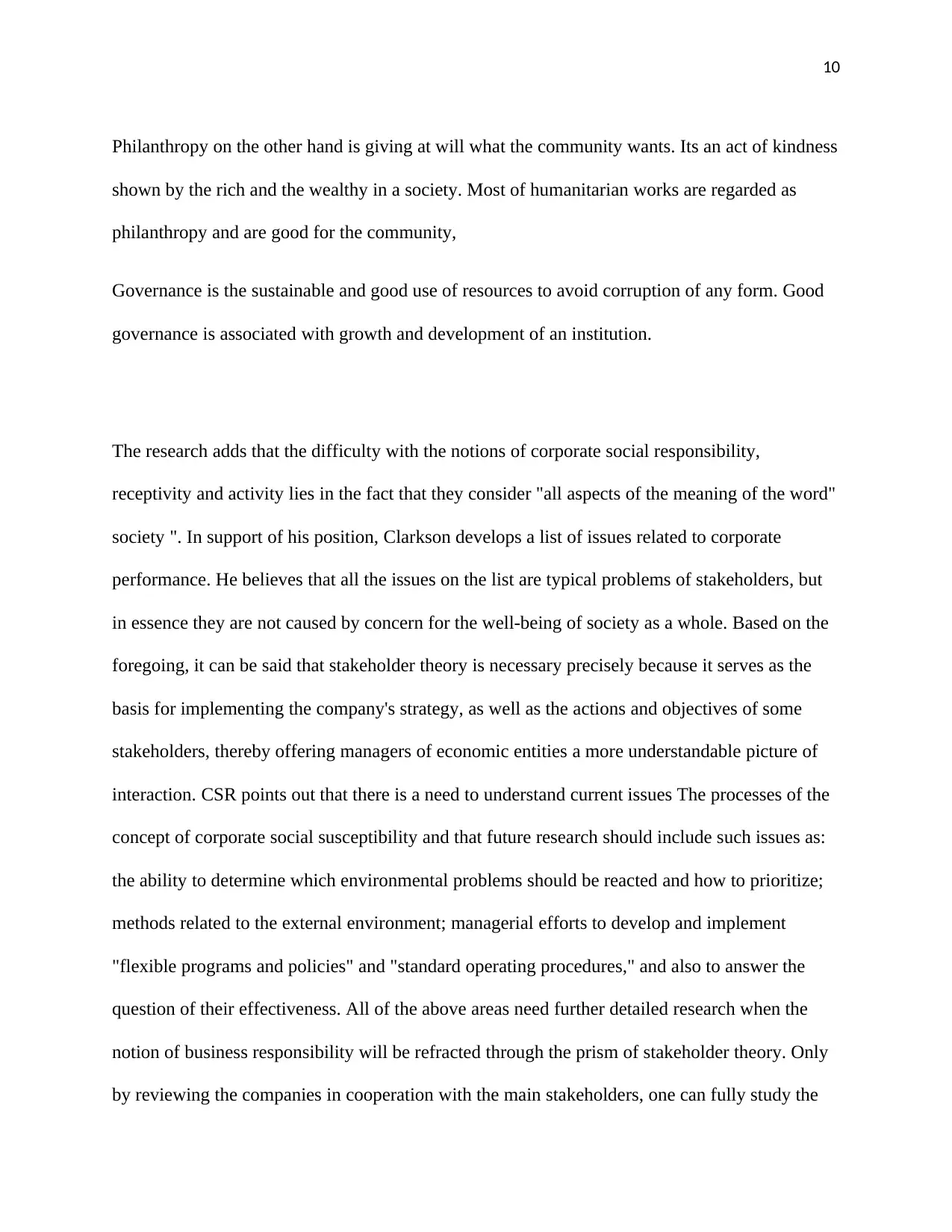
10
Philanthropy on the other hand is giving at will what the community wants. Its an act of kindness
shown by the rich and the wealthy in a society. Most of humanitarian works are regarded as
philanthropy and are good for the community,
Governance is the sustainable and good use of resources to avoid corruption of any form. Good
governance is associated with growth and development of an institution.
The research adds that the difficulty with the notions of corporate social responsibility,
receptivity and activity lies in the fact that they consider "all aspects of the meaning of the word"
society ". In support of his position, Clarkson develops a list of issues related to corporate
performance. He believes that all the issues on the list are typical problems of stakeholders, but
in essence they are not caused by concern for the well-being of society as a whole. Based on the
foregoing, it can be said that stakeholder theory is necessary precisely because it serves as the
basis for implementing the company's strategy, as well as the actions and objectives of some
stakeholders, thereby offering managers of economic entities a more understandable picture of
interaction. CSR points out that there is a need to understand current issues The processes of the
concept of corporate social susceptibility and that future research should include such issues as:
the ability to determine which environmental problems should be reacted and how to prioritize;
methods related to the external environment; managerial efforts to develop and implement
"flexible programs and policies" and "standard operating procedures," and also to answer the
question of their effectiveness. All of the above areas need further detailed research when the
notion of business responsibility will be refracted through the prism of stakeholder theory. Only
by reviewing the companies in cooperation with the main stakeholders, one can fully study the
Philanthropy on the other hand is giving at will what the community wants. Its an act of kindness
shown by the rich and the wealthy in a society. Most of humanitarian works are regarded as
philanthropy and are good for the community,
Governance is the sustainable and good use of resources to avoid corruption of any form. Good
governance is associated with growth and development of an institution.
The research adds that the difficulty with the notions of corporate social responsibility,
receptivity and activity lies in the fact that they consider "all aspects of the meaning of the word"
society ". In support of his position, Clarkson develops a list of issues related to corporate
performance. He believes that all the issues on the list are typical problems of stakeholders, but
in essence they are not caused by concern for the well-being of society as a whole. Based on the
foregoing, it can be said that stakeholder theory is necessary precisely because it serves as the
basis for implementing the company's strategy, as well as the actions and objectives of some
stakeholders, thereby offering managers of economic entities a more understandable picture of
interaction. CSR points out that there is a need to understand current issues The processes of the
concept of corporate social susceptibility and that future research should include such issues as:
the ability to determine which environmental problems should be reacted and how to prioritize;
methods related to the external environment; managerial efforts to develop and implement
"flexible programs and policies" and "standard operating procedures," and also to answer the
question of their effectiveness. All of the above areas need further detailed research when the
notion of business responsibility will be refracted through the prism of stakeholder theory. Only
by reviewing the companies in cooperation with the main stakeholders, one can fully study the
Paraphrase This Document
Need a fresh take? Get an instant paraphrase of this document with our AI Paraphraser
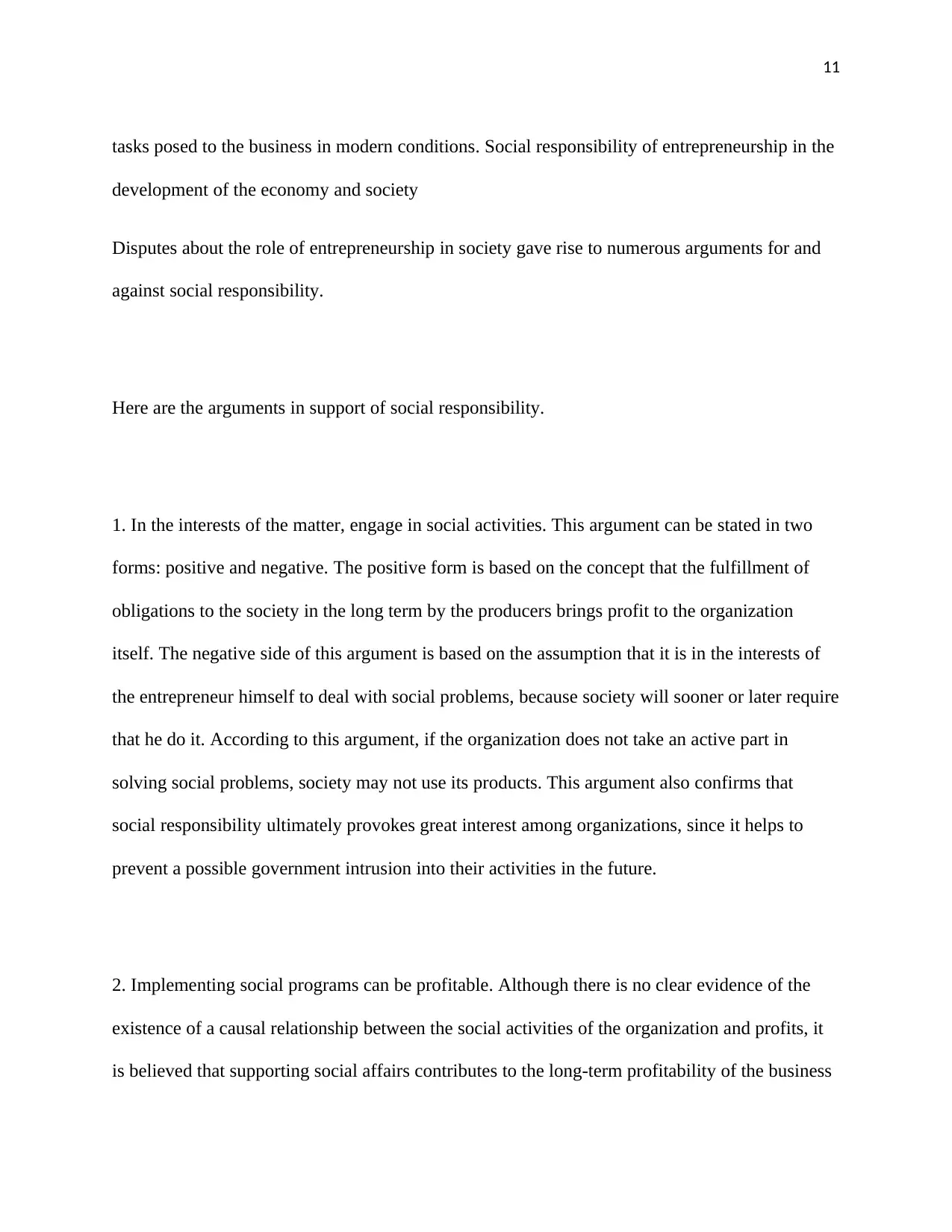
11
tasks posed to the business in modern conditions. Social responsibility of entrepreneurship in the
development of the economy and society
Disputes about the role of entrepreneurship in society gave rise to numerous arguments for and
against social responsibility.
Here are the arguments in support of social responsibility.
1. In the interests of the matter, engage in social activities. This argument can be stated in two
forms: positive and negative. The positive form is based on the concept that the fulfillment of
obligations to the society in the long term by the producers brings profit to the organization
itself. The negative side of this argument is based on the assumption that it is in the interests of
the entrepreneur himself to deal with social problems, because society will sooner or later require
that he do it. According to this argument, if the organization does not take an active part in
solving social problems, society may not use its products. This argument also confirms that
social responsibility ultimately provokes great interest among organizations, since it helps to
prevent a possible government intrusion into their activities in the future.
2. Implementing social programs can be profitable. Although there is no clear evidence of the
existence of a causal relationship between the social activities of the organization and profits, it
is believed that supporting social affairs contributes to the long-term profitability of the business
tasks posed to the business in modern conditions. Social responsibility of entrepreneurship in the
development of the economy and society
Disputes about the role of entrepreneurship in society gave rise to numerous arguments for and
against social responsibility.
Here are the arguments in support of social responsibility.
1. In the interests of the matter, engage in social activities. This argument can be stated in two
forms: positive and negative. The positive form is based on the concept that the fulfillment of
obligations to the society in the long term by the producers brings profit to the organization
itself. The negative side of this argument is based on the assumption that it is in the interests of
the entrepreneur himself to deal with social problems, because society will sooner or later require
that he do it. According to this argument, if the organization does not take an active part in
solving social problems, society may not use its products. This argument also confirms that
social responsibility ultimately provokes great interest among organizations, since it helps to
prevent a possible government intrusion into their activities in the future.
2. Implementing social programs can be profitable. Although there is no clear evidence of the
existence of a causal relationship between the social activities of the organization and profits, it
is believed that supporting social affairs contributes to the long-term profitability of the business
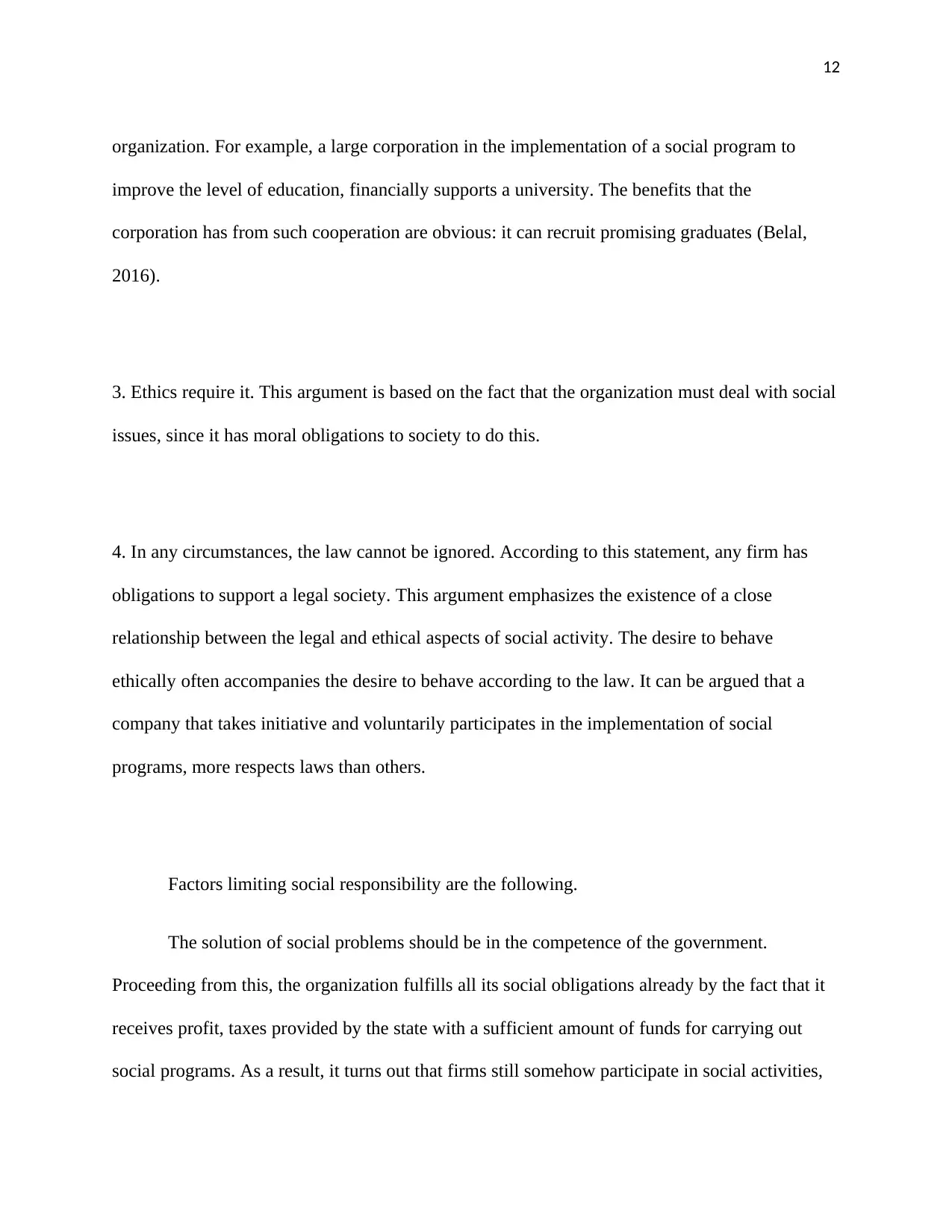
12
organization. For example, a large corporation in the implementation of a social program to
improve the level of education, financially supports a university. The benefits that the
corporation has from such cooperation are obvious: it can recruit promising graduates (Belal,
2016).
3. Ethics require it. This argument is based on the fact that the organization must deal with social
issues, since it has moral obligations to society to do this.
4. In any circumstances, the law cannot be ignored. According to this statement, any firm has
obligations to support a legal society. This argument emphasizes the existence of a close
relationship between the legal and ethical aspects of social activity. The desire to behave
ethically often accompanies the desire to behave according to the law. It can be argued that a
company that takes initiative and voluntarily participates in the implementation of social
programs, more respects laws than others.
Factors limiting social responsibility are the following.
The solution of social problems should be in the competence of the government.
Proceeding from this, the organization fulfills all its social obligations already by the fact that it
receives profit, taxes provided by the state with a sufficient amount of funds for carrying out
social programs. As a result, it turns out that firms still somehow participate in social activities,
organization. For example, a large corporation in the implementation of a social program to
improve the level of education, financially supports a university. The benefits that the
corporation has from such cooperation are obvious: it can recruit promising graduates (Belal,
2016).
3. Ethics require it. This argument is based on the fact that the organization must deal with social
issues, since it has moral obligations to society to do this.
4. In any circumstances, the law cannot be ignored. According to this statement, any firm has
obligations to support a legal society. This argument emphasizes the existence of a close
relationship between the legal and ethical aspects of social activity. The desire to behave
ethically often accompanies the desire to behave according to the law. It can be argued that a
company that takes initiative and voluntarily participates in the implementation of social
programs, more respects laws than others.
Factors limiting social responsibility are the following.
The solution of social problems should be in the competence of the government.
Proceeding from this, the organization fulfills all its social obligations already by the fact that it
receives profit, taxes provided by the state with a sufficient amount of funds for carrying out
social programs. As a result, it turns out that firms still somehow participate in social activities,
⊘ This is a preview!⊘
Do you want full access?
Subscribe today to unlock all pages.

Trusted by 1+ million students worldwide
1 out of 25
Related Documents
Your All-in-One AI-Powered Toolkit for Academic Success.
+13062052269
info@desklib.com
Available 24*7 on WhatsApp / Email
![[object Object]](/_next/static/media/star-bottom.7253800d.svg)
Unlock your academic potential
Copyright © 2020–2026 A2Z Services. All Rights Reserved. Developed and managed by ZUCOL.





